人教版高中英语选修八 Unit4 Pygmalion reading课件(共69张)
文档属性
| 名称 | 人教版高中英语选修八 Unit4 Pygmalion reading课件(共69张) |  | |
| 格式 | zip | ||
| 文件大小 | 574.0KB | ||
| 资源类型 | 教案 | ||
| 版本资源 | 人教版(新课程标准) | ||
| 科目 | 英语 | ||
| 更新时间 | 2019-03-04 21:45:58 | ||
图片预览

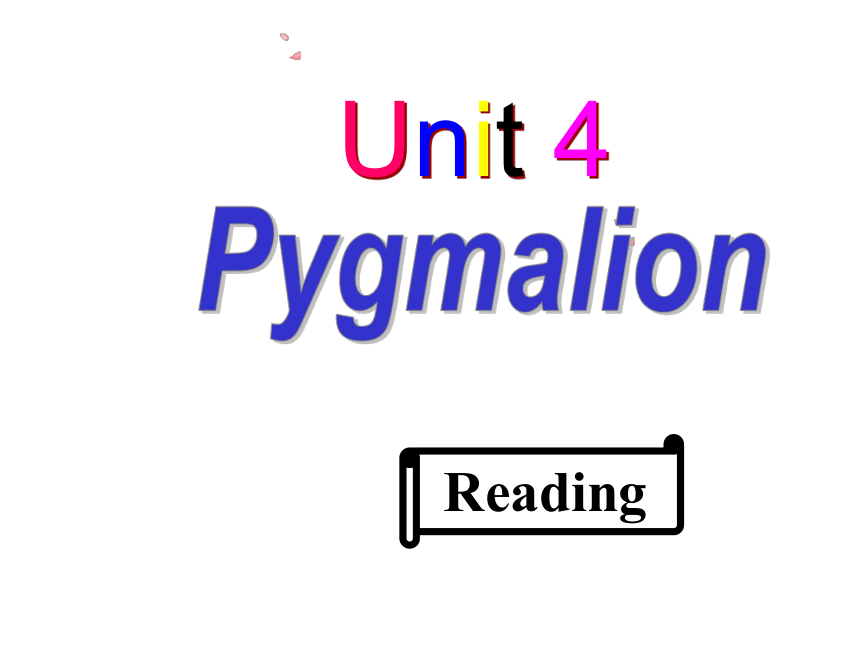
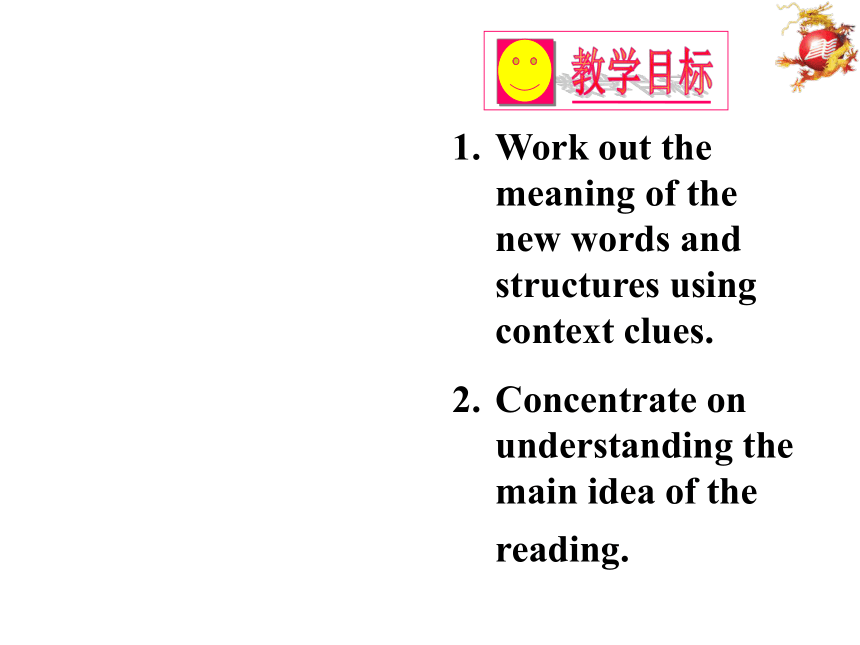
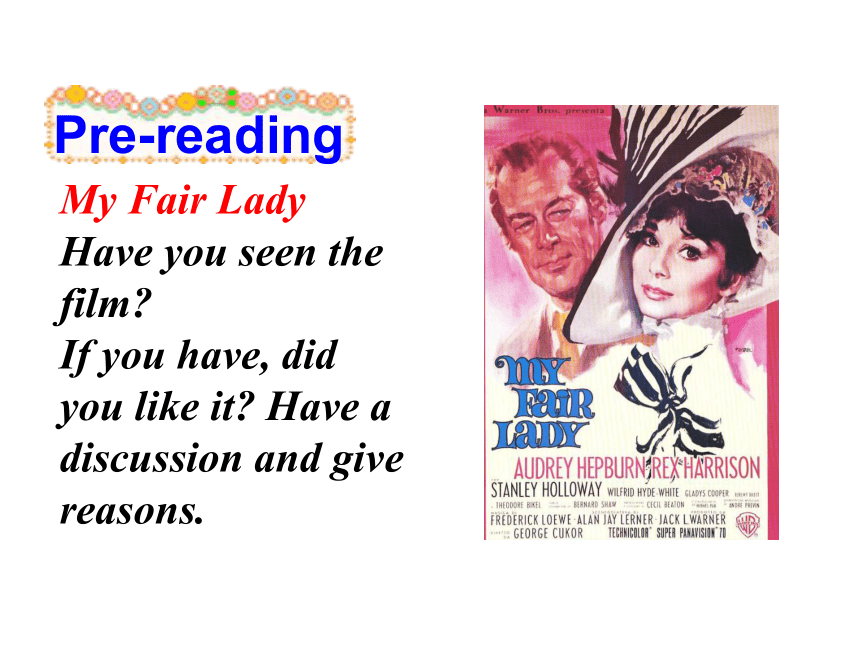
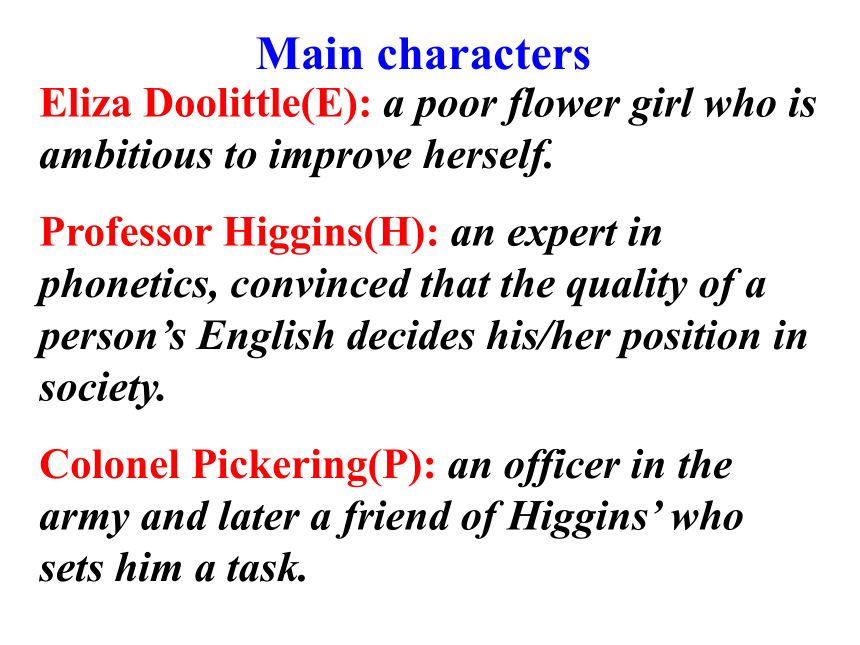
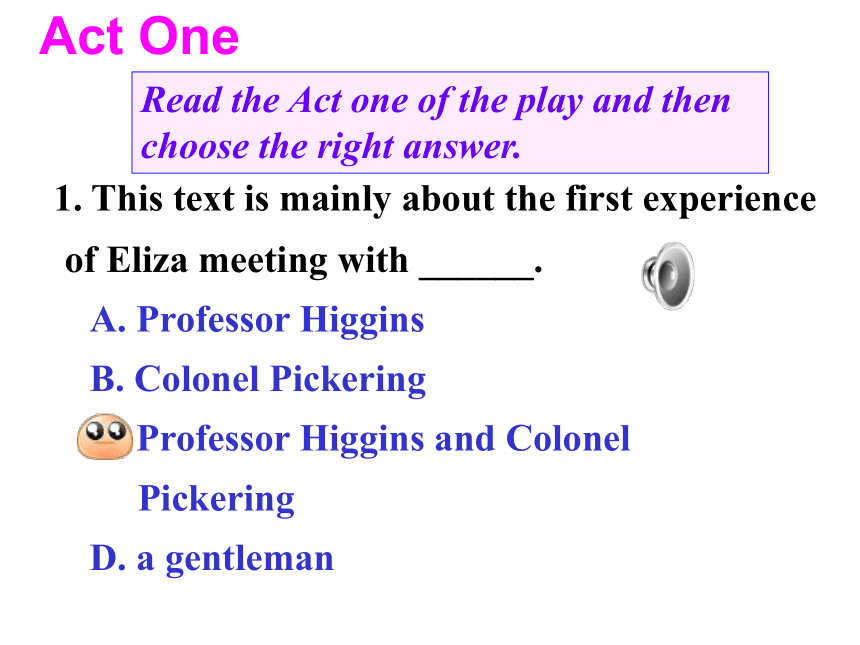
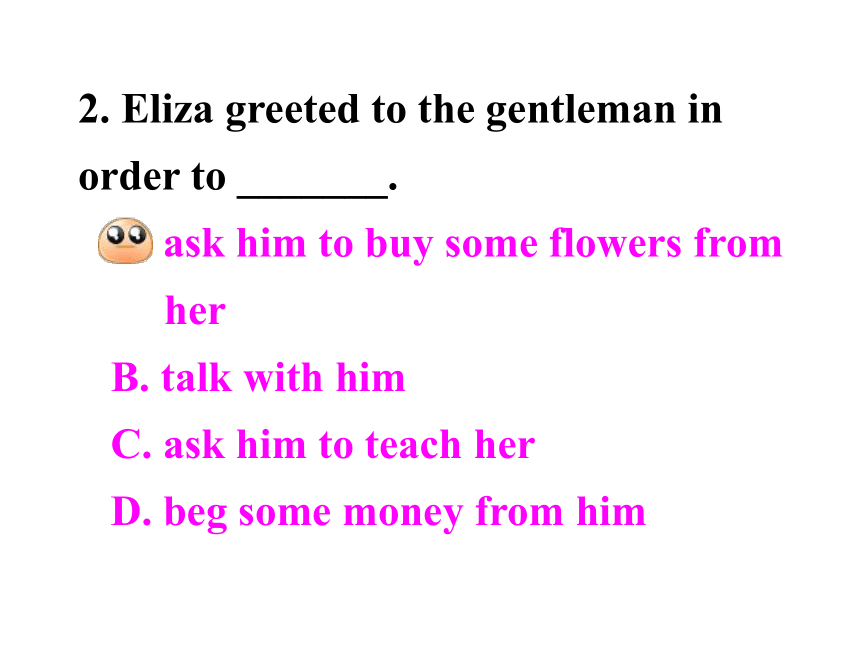
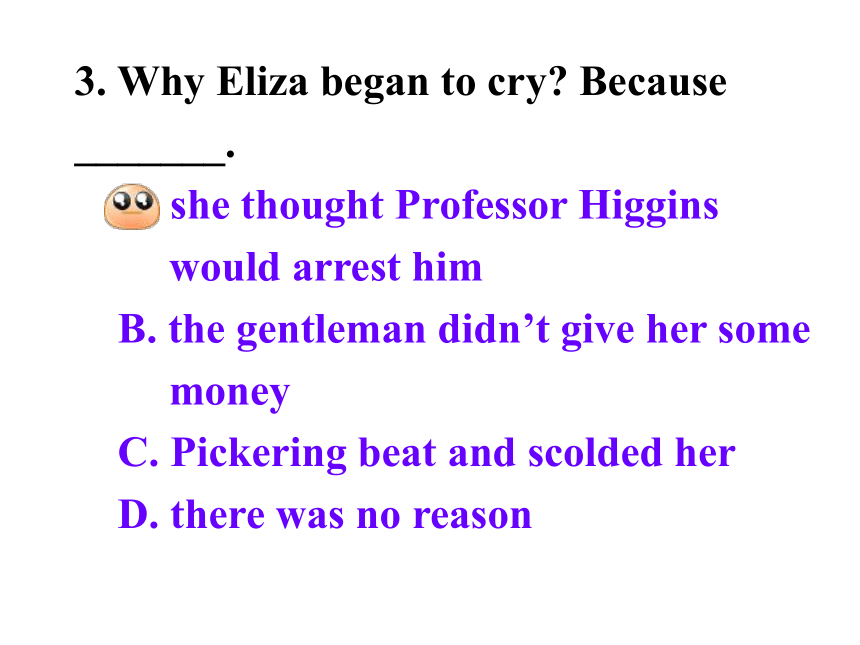
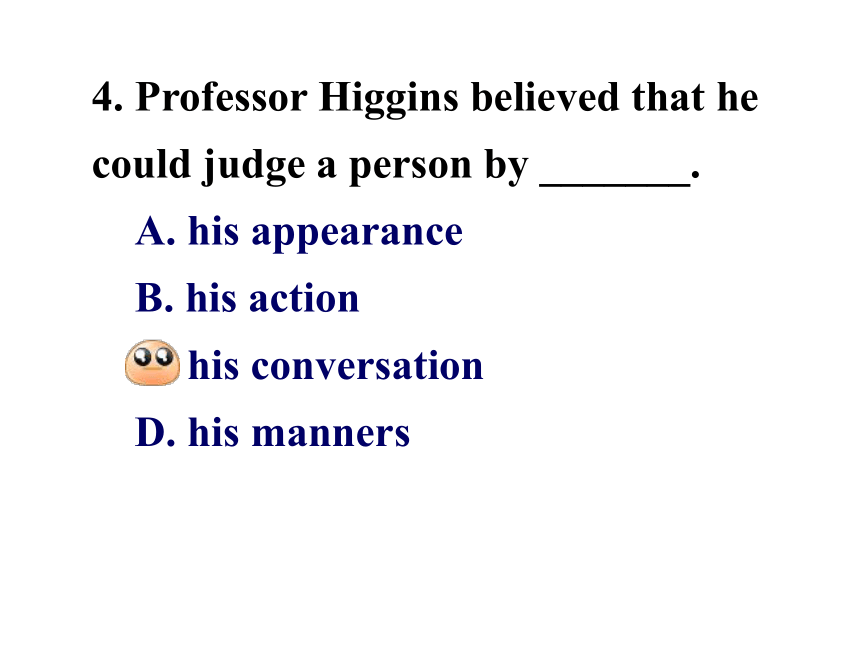
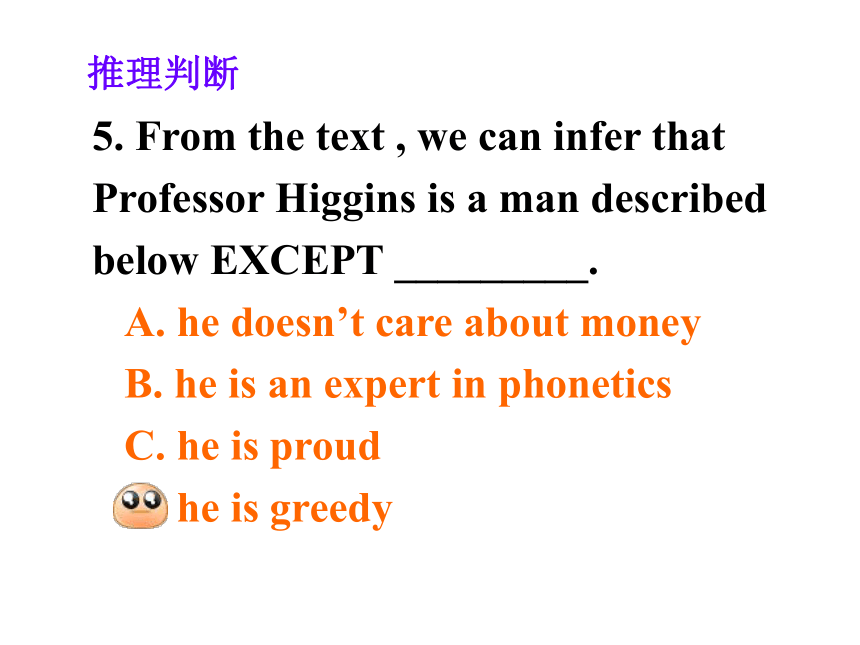
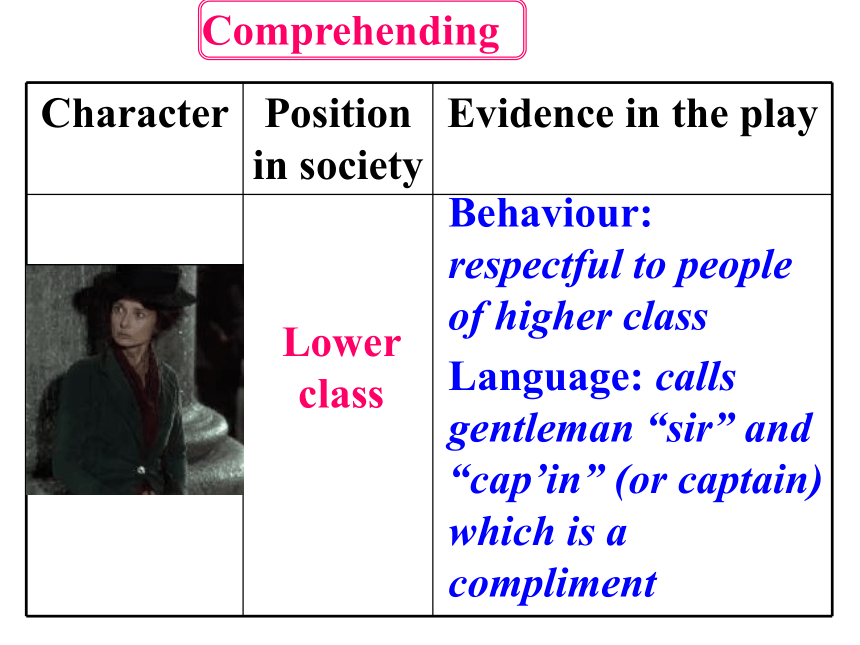
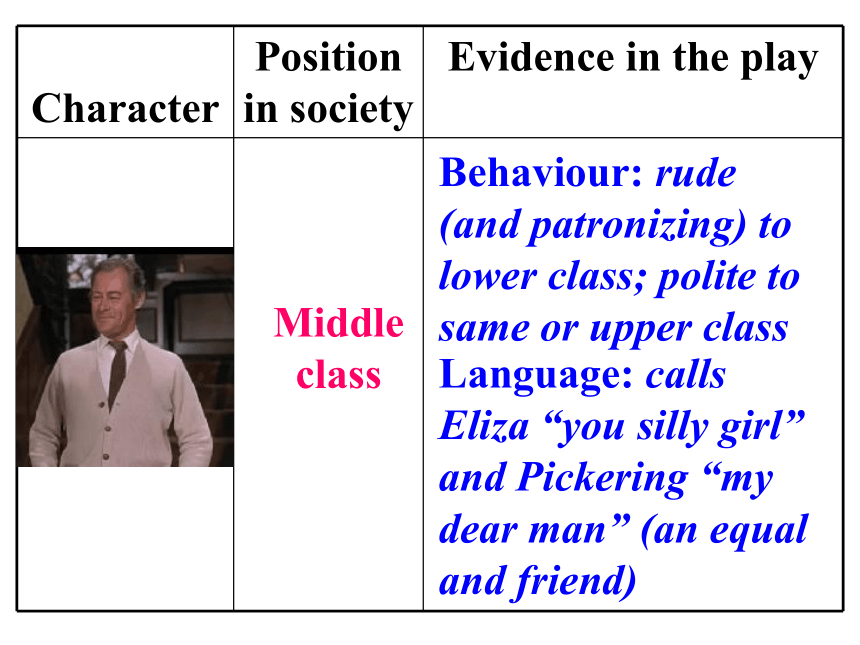
文档简介
课件69张PPT。新课标高二版.选修八Unit 4PygmalionReading Work out the meaning of the new words and structures using context clues.
Concentrate on understanding the main idea of the reading. My Fair Lady
Have you seen the film?
If you have, did you like it? Have a discussion and give reasons.Pre-readingEliza Doolittle(E): a poor flower girl who is ambitious to improve herself.
Professor Higgins(H): an expert in phonetics, convinced that the quality of a person’s English decides his/her position in society.
Colonel Pickering(P): an officer in the army and later a friend of Higgins’ who sets him a task.Main characters 1. This text is mainly about the first experience of Eliza meeting with ______.
A. Professor Higgins
B. Colonel Pickering
C. Professor Higgins and Colonel
Pickering
D. a gentlemanAct OneRead the Act one of the play and then choose the right answer. 2. Eliza greeted to the gentleman in order to _______.
A. ask him to buy some flowers from
her
B. talk with him
C. ask him to teach her
D. beg some money from him 3. Why Eliza began to cry? Because
_______.
A. she thought Professor Higgins would arrest him
B. the gentleman didn’t give her some money
C. Pickering beat and scolded her
D. there was no reason 4. Professor Higgins believed that he could judge a person by _______.
A. his appearance
B. his action
C. his conversation
D. his manners 5. From the text , we can infer that Professor Higgins is a man described below EXCEPT _________.
A. he doesn’t care about money
B. he is an expert in phonetics
C. he is proud
D. he is greedy推理判断Lower classLanguage: calls gentleman “sir” and “cap’in” (or captain) which is a complimentBehaviour: respectful to people of higher classComprehending Language: calls Eliza “you silly girl” and Pickering “my dear man” (an equal and friend)Behaviour: rude (and patronizing) to lower class; polite to same or upper classMiddle classUpper classLanguage: prepared to begin a conversation with Henry, whom he does not know; generous with praise to himBehaviour: generally confident and polite; but ignores Eliza2 Attitude to Eliza (L)
Is the statement true?
1 Yes; 1 Attitude to Colonel Pickering (H)2 watches her; notes her reactions; talks about her in front of her; calls her silly girl1 respects his professional work as a phonetician; calls him sir and my dear man2 Yes1 appreciates his expertise; praises him; asks his opinion; happy to be friends
2 ignores her; does not stop Henry when he talks about Eliza in front of her (which is very rude)1 Attitude to Henry Higgins (L)
2 Attitude to Eliza (L)
Is the statement true?
1 Yes; 2 Yes1 anxious; eager not to do the wrong thing; ambitious to improve herself; respectful and curious about Henry’s expertise
2 resents not being included in the conversation when talked about1 Attitude to Henry Higgins (H)
2 Attitude to Colonel Pickering (H)
Is the statement true?
1 Yes; 2 Unclearkind, polite, generous,
enthusiastic, eager, confident impatient, rude, confident,
superior, self-importantanxious, eager, emotional,
ambitious, unsure1. Professor Higgins (H): an expert in phonetics, convinced that the quality of a person’s English decides his/her position in society. 希金斯教授是一位语音学专家, 他认为一个人的英语水平决定了他(她)的社会地位。Language points▲ convince vt. to cause to believe or feel certain; to persuade 说服; 使相信; 说(某人)
① We convinced him to go by train rather than plane. 我们说服了他坐火车去,不要搭飞机。② I tried to convince my wife that we can’t afford a new car. 我试图说服我妻子我们买不起新车。
convinced adj. 坚信的;意志坚定的
convincing adj. 令人信服的2. Colonel Pickering (P): an officer in the army and later a friend of Higgins’ who sets him a task. 皮克林上校(简称P):陆军军官, 后来成为希金斯的朋友。希金斯给他安排了一项任务。▲ officer与official
officer 主要用于指军官,也可指公司或政府机构中的高级职员;
official 指政府内的文职官员,用作形容词时指“ 官方的, 正式的”。① The officers live at headquarters and the soldiers live in the camps. 军官住在总部,士兵住在军营。
② The president and his ministers are government officials. 总统和部长为政府高级官员。▲ set
(1) vt.安排; 布置(岗哨); 定(时间、标准);创造(记录);专心于
① Set guards around the gate. 在大门四周布下卫兵。
② The time and date of the meeting have not yet been set. 开会时间与日期尚未确定。③ He set a new record. 他创下了一项新记录。
④ Nothing in the world is difficult for one who sets his mind to it. 世上无难事, 只怕有心人。(2) vt. 使……做某事;使……处于某种状态
⑤ I opened the cage and set the bird free. 我把鸟笼打开,让鸟自由飞翔。
⑥ A spark set the woods on fire. 星星之火使整个森林燃烧起来。(3) vi. (日、月等) 下落;下沉
⑦ It will be cooler when the sun has set. 日落后天就会凉爽起来。
(4) n.一套,一组;电器设备
⑧ I bought a set of Lu Xun’s short stories. 我买了一套鲁迅短篇小说集。
⑨ I need a radio set. 我需要一台收音机。set off 出发, 动身
set out 出发, 着手
set about 开始,着手
set up 建立, 成立
set sb. good example 为某人树立好榜样It’s ten years since the scientist ___ on his life work of discovering the valuable chemical.
A. made for B. set out C. took off D. turned up3. While watching, he makes notes.
他一边观察, 一边做笔记。
▲ while watching 为while he was watching 省略句。在以when, while, if, unless等引导的状语从句中,如果从句中的主语与主句主语一致且从句谓语动词含有be动词的形式,往往将从句中的主语及be动词省略,而以动词的-ing形式或过去分词形式来代替。① After finishing the work, he went home. 完成工作后他就回家了。
② After being discussed, the plan should be carried out at once. 计划讨论后, 应立即实施。
③ While crossing the street, look out for cars passing by. 过马路时, 小心过路车辆。When_____ help, one often says “Thank you.” or “It’s kind of you.”
A. offering
B. to offer
C. to be offered80
D. offered
2) While______ the river, he saw a big crocodile.
to cross
B. crossing
C. cross
D. crossed
3) Before______ , the play must be examined by the director.
putting on
B. to be put on
C. put on
D. being put on
4) -What’s the matter with you?
-_____ the window, my finger was cut unexpectedly.
A. Cleaning
B. To clean
C. While cleaning
D. While I was cleaning
5) Never_____ faith in himself, the scientist went on with his research.
A. losing
B. to lose
C. lost
D. to be lost4. I ain’t done nothing wrong by speaking to that gentleman. 我跟那位先生说话,又没做什么坏事呀。
▲ ain’t 是不规范的语言,相当于am not, is not, has not, have not.
① We ain’t coming. 我们不来了。
② They ain’t got it. 他们没有那玩意儿。▲ nothing wrong 中的wrong是形容词作后置定语, 修饰nothing。形容词修饰不定代词时, 必须置于不定代词之后。
① There’s something wrong with my watch. 我的表出毛病了。② Please come earlier. Something important will be announced. 请早点来,有重要的事情要宣布。
③ Is there anything interesting? 有什么有趣的事吗?5. Here you are (hands over the paper covered with writing). 给你(他把写满字的纸递过来)
▲ hand over 移交; 让与;交给某人照料
① The captain was unwilling to hand over the command of his ship. 船长不愿移交军舰的指挥权。② The thief was handed over to the policeman. 小偷被交给警察处理。
hand down 传给
hand on 传递
hands up 举手
hand out 分给, 分发It is certain that he will ____ his business to his son when he gets old.
A. take over
B. think over
C. hand over
D. go over▲ covered with writing 为过去分词短语作后置定语, 相当于定语从句which/that is covered with writing.
① The concert given by him was a great success.
由他举行的音乐会很成功。② The first textbooks written for teaching English as a foreign language came out in the 18th century. 最早为外语教师而写的英语课本出现在18世纪。 ③ Some of them, born and brought up
in villages, had never seen a train.
他们当中的一些人生长在农村, 从未
见过火车。
④ The meeting held yesterday proved to
be a success.
昨天开的那次会议证明很成功。1)Some of the suspects______ refused to answer and kept their mouths shut.
questioning
B. being questioned
C. questioned
D. to be questioned2)You will find the word “psychology”
______ under “P” in any dictionary.
have listed
B. to be listed
C. listing itself
D. listed3)The amount of money______ for the seriously sick child was soon collected.
to need
needed
C. needing
D. which needed4)All cars ______ nowadays are equipped with safety belts, _____ are helpful to drivers.
A. being produced; they
B. to be produced; which
C. produced; which
D. produced; they6. What if I was?
如果我是又怎样呢?
此句为省略句。原句为: What if I was born in…?
What if…意思为“要是……又会怎样?”。7. People begin their working life in a poor neighbor of London with 80 pounds a year and end in a rich one with 100 thousand.
人们在伦敦的一个贫穷地区开始工作, 年薪80英镑,而最终成为拥有10万英镑的富人。
此句为并列句, 主句为 people begin…and end in…; in a poor…with, in a rich.. with 在句中作状语。8. But they betray themselves every time they open their mouths.
但是他们一张嘴就露了馅。
Don’t stop every time you come to a word or phrase you don’t know.
你遇到一个你不会的单词或词组不要每次都停下来。You’re welcome to come back any time
you want to.
你想什么时候来我们都欢迎。
He called to see me the first time he
came to Nanjing.
第一次他来南京就打电话来看我。 Next time you come, you’ll see him.
下次你来的时候就看见他了。
有些表示时间的短语可引导时间状语从句,如:the instant, the moment, the day , the year, each (every) time, next time, the first (second…) time等。1)The minute _____ he saw her, he fell in love.
A. when B. /
C. that D. which2)_____ I come he is reading.
While B. Every time
C. The last D. After3) By the time you arrive in London, we
_____ in Europe for two weeks.
A. shall stay
B. have stayed
C. will have stayed
D. have been staying4) The moment I _____ her, I knew something _____ wrong.
A. have seen; gone
B. had seen; had
C. saw; was
D. see; had gone9.Now once taught by me…
一旦由我来教, … …
When finished, the homework was handed in.
作业一完成就交上了去。 Although tired, he continued climbing.
尽管很累, 但他仍继续爬着。
比较:While being operated, the machine sent off a lot of smoke.
机器被操作时, 冒出许多烟。 以once, if, as, unless, when, though, although引导的状语从句, 若从句主语与主句主语一致, 且从句中谓语动词为 be+v.-ed 形式, 或从句中主谓结构为 it is (was)+ adj.时, 则从句结构可以直接由以上连词加v-ed或adj.代替。
1)When first______ to the market, these products enjoyed great success.
A. introducing B. introduced
C. introduce D. being introduced 2)_____, the vitamin C in them will be destroyed.
If vegetables are cooked too long
If cooked too long
If cooking too long
If being cooked too long3)This is an illness that may result in total blindness if left______.
A. being untreated
B. untreated
C. not treating
D. not having treated4) Ask him go take you home _____ possible.
A. at B. while
C. if D. if they10. But, sir, (proudly) once educated to speak properly, the girl could pass herself off in three months as a duchess at an ambassador’s garden party. 可是,先生(自豪地), 一旦那个女孩被教会说正确的英语, 她就能够在三个月后由一位大使举办的舞会上冒充一位女公爵。 这是一个复合句,从句为once she is educated to speak properly 的省略形式。
▲ pass off… as… 冒充
① She passed herself off as an American. 她冒充是美国人。② He passed his secretary off as wife. 他把秘书冒充他的妻子。
pass off 停止; 顺利地举行; 躲开
pass by 走过; 不理会
pass on 传递
pass through 通过, 穿过 Exercise 1&5 on Pages 30-33 for comprehension.
Exercises 1&2 on Page 33.
Exercise 1&2 on pages 72-73 for using structures. Homework
Concentrate on understanding the main idea of the reading. My Fair Lady
Have you seen the film?
If you have, did you like it? Have a discussion and give reasons.Pre-readingEliza Doolittle(E): a poor flower girl who is ambitious to improve herself.
Professor Higgins(H): an expert in phonetics, convinced that the quality of a person’s English decides his/her position in society.
Colonel Pickering(P): an officer in the army and later a friend of Higgins’ who sets him a task.Main characters 1. This text is mainly about the first experience of Eliza meeting with ______.
A. Professor Higgins
B. Colonel Pickering
C. Professor Higgins and Colonel
Pickering
D. a gentlemanAct OneRead the Act one of the play and then choose the right answer. 2. Eliza greeted to the gentleman in order to _______.
A. ask him to buy some flowers from
her
B. talk with him
C. ask him to teach her
D. beg some money from him 3. Why Eliza began to cry? Because
_______.
A. she thought Professor Higgins would arrest him
B. the gentleman didn’t give her some money
C. Pickering beat and scolded her
D. there was no reason 4. Professor Higgins believed that he could judge a person by _______.
A. his appearance
B. his action
C. his conversation
D. his manners 5. From the text , we can infer that Professor Higgins is a man described below EXCEPT _________.
A. he doesn’t care about money
B. he is an expert in phonetics
C. he is proud
D. he is greedy推理判断Lower classLanguage: calls gentleman “sir” and “cap’in” (or captain) which is a complimentBehaviour: respectful to people of higher classComprehending Language: calls Eliza “you silly girl” and Pickering “my dear man” (an equal and friend)Behaviour: rude (and patronizing) to lower class; polite to same or upper classMiddle classUpper classLanguage: prepared to begin a conversation with Henry, whom he does not know; generous with praise to himBehaviour: generally confident and polite; but ignores Eliza2 Attitude to Eliza (L)
Is the statement true?
1 Yes; 1 Attitude to Colonel Pickering (H)2 watches her; notes her reactions; talks about her in front of her; calls her silly girl1 respects his professional work as a phonetician; calls him sir and my dear man2 Yes1 appreciates his expertise; praises him; asks his opinion; happy to be friends
2 ignores her; does not stop Henry when he talks about Eliza in front of her (which is very rude)1 Attitude to Henry Higgins (L)
2 Attitude to Eliza (L)
Is the statement true?
1 Yes; 2 Yes1 anxious; eager not to do the wrong thing; ambitious to improve herself; respectful and curious about Henry’s expertise
2 resents not being included in the conversation when talked about1 Attitude to Henry Higgins (H)
2 Attitude to Colonel Pickering (H)
Is the statement true?
1 Yes; 2 Unclearkind, polite, generous,
enthusiastic, eager, confident impatient, rude, confident,
superior, self-importantanxious, eager, emotional,
ambitious, unsure1. Professor Higgins (H): an expert in phonetics, convinced that the quality of a person’s English decides his/her position in society. 希金斯教授是一位语音学专家, 他认为一个人的英语水平决定了他(她)的社会地位。Language points▲ convince vt. to cause to believe or feel certain; to persuade 说服; 使相信; 说(某人)
① We convinced him to go by train rather than plane. 我们说服了他坐火车去,不要搭飞机。② I tried to convince my wife that we can’t afford a new car. 我试图说服我妻子我们买不起新车。
convinced adj. 坚信的;意志坚定的
convincing adj. 令人信服的2. Colonel Pickering (P): an officer in the army and later a friend of Higgins’ who sets him a task. 皮克林上校(简称P):陆军军官, 后来成为希金斯的朋友。希金斯给他安排了一项任务。▲ officer与official
officer 主要用于指军官,也可指公司或政府机构中的高级职员;
official 指政府内的文职官员,用作形容词时指“ 官方的, 正式的”。① The officers live at headquarters and the soldiers live in the camps. 军官住在总部,士兵住在军营。
② The president and his ministers are government officials. 总统和部长为政府高级官员。▲ set
(1) vt.安排; 布置(岗哨); 定(时间、标准);创造(记录);专心于
① Set guards around the gate. 在大门四周布下卫兵。
② The time and date of the meeting have not yet been set. 开会时间与日期尚未确定。③ He set a new record. 他创下了一项新记录。
④ Nothing in the world is difficult for one who sets his mind to it. 世上无难事, 只怕有心人。(2) vt. 使……做某事;使……处于某种状态
⑤ I opened the cage and set the bird free. 我把鸟笼打开,让鸟自由飞翔。
⑥ A spark set the woods on fire. 星星之火使整个森林燃烧起来。(3) vi. (日、月等) 下落;下沉
⑦ It will be cooler when the sun has set. 日落后天就会凉爽起来。
(4) n.一套,一组;电器设备
⑧ I bought a set of Lu Xun’s short stories. 我买了一套鲁迅短篇小说集。
⑨ I need a radio set. 我需要一台收音机。set off 出发, 动身
set out 出发, 着手
set about 开始,着手
set up 建立, 成立
set sb. good example 为某人树立好榜样It’s ten years since the scientist ___ on his life work of discovering the valuable chemical.
A. made for B. set out C. took off D. turned up3. While watching, he makes notes.
他一边观察, 一边做笔记。
▲ while watching 为while he was watching 省略句。在以when, while, if, unless等引导的状语从句中,如果从句中的主语与主句主语一致且从句谓语动词含有be动词的形式,往往将从句中的主语及be动词省略,而以动词的-ing形式或过去分词形式来代替。① After finishing the work, he went home. 完成工作后他就回家了。
② After being discussed, the plan should be carried out at once. 计划讨论后, 应立即实施。
③ While crossing the street, look out for cars passing by. 过马路时, 小心过路车辆。When_____ help, one often says “Thank you.” or “It’s kind of you.”
A. offering
B. to offer
C. to be offered80
D. offered
2) While______ the river, he saw a big crocodile.
to cross
B. crossing
C. cross
D. crossed
3) Before______ , the play must be examined by the director.
putting on
B. to be put on
C. put on
D. being put on
4) -What’s the matter with you?
-_____ the window, my finger was cut unexpectedly.
A. Cleaning
B. To clean
C. While cleaning
D. While I was cleaning
5) Never_____ faith in himself, the scientist went on with his research.
A. losing
B. to lose
C. lost
D. to be lost4. I ain’t done nothing wrong by speaking to that gentleman. 我跟那位先生说话,又没做什么坏事呀。
▲ ain’t 是不规范的语言,相当于am not, is not, has not, have not.
① We ain’t coming. 我们不来了。
② They ain’t got it. 他们没有那玩意儿。▲ nothing wrong 中的wrong是形容词作后置定语, 修饰nothing。形容词修饰不定代词时, 必须置于不定代词之后。
① There’s something wrong with my watch. 我的表出毛病了。② Please come earlier. Something important will be announced. 请早点来,有重要的事情要宣布。
③ Is there anything interesting? 有什么有趣的事吗?5. Here you are (hands over the paper covered with writing). 给你(他把写满字的纸递过来)
▲ hand over 移交; 让与;交给某人照料
① The captain was unwilling to hand over the command of his ship. 船长不愿移交军舰的指挥权。② The thief was handed over to the policeman. 小偷被交给警察处理。
hand down 传给
hand on 传递
hands up 举手
hand out 分给, 分发It is certain that he will ____ his business to his son when he gets old.
A. take over
B. think over
C. hand over
D. go over▲ covered with writing 为过去分词短语作后置定语, 相当于定语从句which/that is covered with writing.
① The concert given by him was a great success.
由他举行的音乐会很成功。② The first textbooks written for teaching English as a foreign language came out in the 18th century. 最早为外语教师而写的英语课本出现在18世纪。 ③ Some of them, born and brought up
in villages, had never seen a train.
他们当中的一些人生长在农村, 从未
见过火车。
④ The meeting held yesterday proved to
be a success.
昨天开的那次会议证明很成功。1)Some of the suspects______ refused to answer and kept their mouths shut.
questioning
B. being questioned
C. questioned
D. to be questioned2)You will find the word “psychology”
______ under “P” in any dictionary.
have listed
B. to be listed
C. listing itself
D. listed3)The amount of money______ for the seriously sick child was soon collected.
to need
needed
C. needing
D. which needed4)All cars ______ nowadays are equipped with safety belts, _____ are helpful to drivers.
A. being produced; they
B. to be produced; which
C. produced; which
D. produced; they6. What if I was?
如果我是又怎样呢?
此句为省略句。原句为: What if I was born in…?
What if…意思为“要是……又会怎样?”。7. People begin their working life in a poor neighbor of London with 80 pounds a year and end in a rich one with 100 thousand.
人们在伦敦的一个贫穷地区开始工作, 年薪80英镑,而最终成为拥有10万英镑的富人。
此句为并列句, 主句为 people begin…and end in…; in a poor…with, in a rich.. with 在句中作状语。8. But they betray themselves every time they open their mouths.
但是他们一张嘴就露了馅。
Don’t stop every time you come to a word or phrase you don’t know.
你遇到一个你不会的单词或词组不要每次都停下来。You’re welcome to come back any time
you want to.
你想什么时候来我们都欢迎。
He called to see me the first time he
came to Nanjing.
第一次他来南京就打电话来看我。 Next time you come, you’ll see him.
下次你来的时候就看见他了。
有些表示时间的短语可引导时间状语从句,如:the instant, the moment, the day , the year, each (every) time, next time, the first (second…) time等。1)The minute _____ he saw her, he fell in love.
A. when B. /
C. that D. which2)_____ I come he is reading.
While B. Every time
C. The last D. After3) By the time you arrive in London, we
_____ in Europe for two weeks.
A. shall stay
B. have stayed
C. will have stayed
D. have been staying4) The moment I _____ her, I knew something _____ wrong.
A. have seen; gone
B. had seen; had
C. saw; was
D. see; had gone9.Now once taught by me…
一旦由我来教, … …
When finished, the homework was handed in.
作业一完成就交上了去。 Although tired, he continued climbing.
尽管很累, 但他仍继续爬着。
比较:While being operated, the machine sent off a lot of smoke.
机器被操作时, 冒出许多烟。 以once, if, as, unless, when, though, although引导的状语从句, 若从句主语与主句主语一致, 且从句中谓语动词为 be+v.-ed 形式, 或从句中主谓结构为 it is (was)+ adj.时, 则从句结构可以直接由以上连词加v-ed或adj.代替。
1)When first______ to the market, these products enjoyed great success.
A. introducing B. introduced
C. introduce D. being introduced 2)_____, the vitamin C in them will be destroyed.
If vegetables are cooked too long
If cooked too long
If cooking too long
If being cooked too long3)This is an illness that may result in total blindness if left______.
A. being untreated
B. untreated
C. not treating
D. not having treated4) Ask him go take you home _____ possible.
A. at B. while
C. if D. if they10. But, sir, (proudly) once educated to speak properly, the girl could pass herself off in three months as a duchess at an ambassador’s garden party. 可是,先生(自豪地), 一旦那个女孩被教会说正确的英语, 她就能够在三个月后由一位大使举办的舞会上冒充一位女公爵。 这是一个复合句,从句为once she is educated to speak properly 的省略形式。
▲ pass off… as… 冒充
① She passed herself off as an American. 她冒充是美国人。② He passed his secretary off as wife. 他把秘书冒充他的妻子。
pass off 停止; 顺利地举行; 躲开
pass by 走过; 不理会
pass on 传递
pass through 通过, 穿过 Exercise 1&5 on Pages 30-33 for comprehension.
Exercises 1&2 on Page 33.
Exercise 1&2 on pages 72-73 for using structures. Homework
